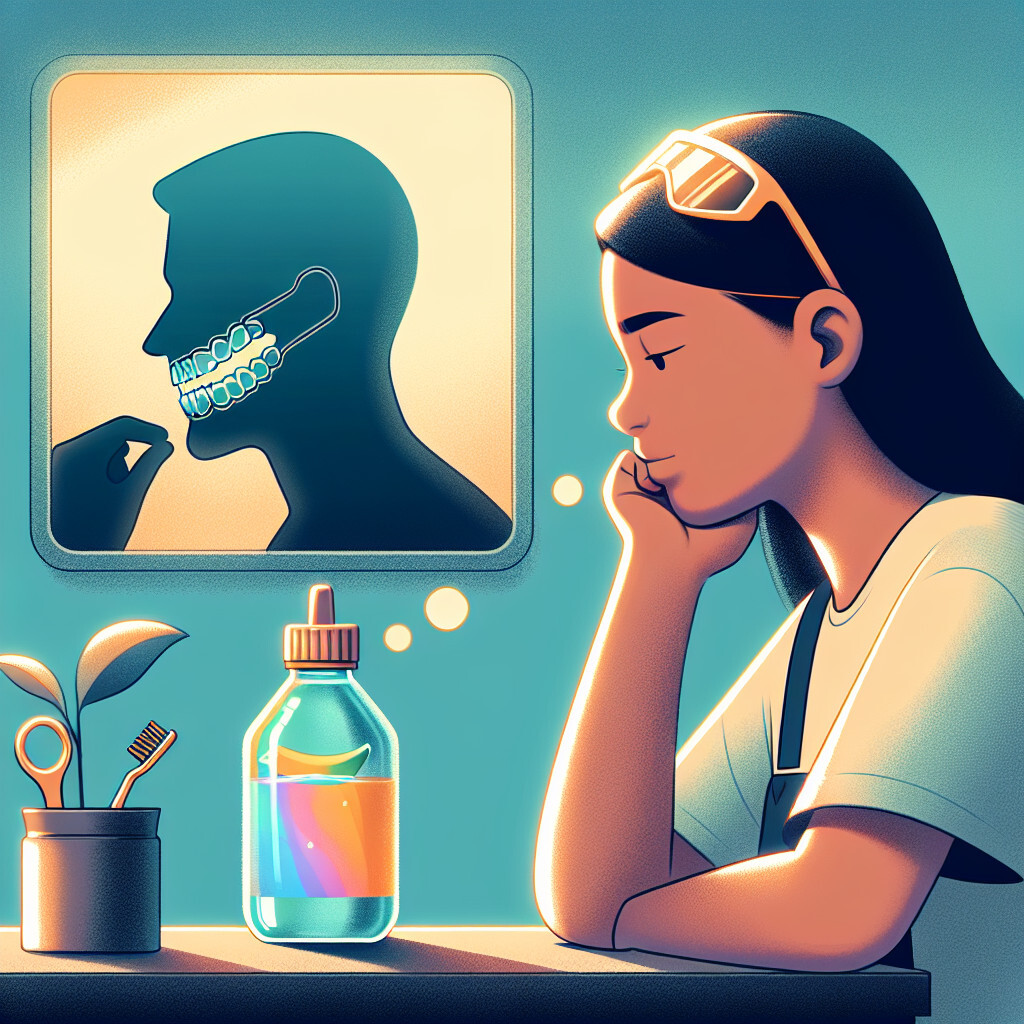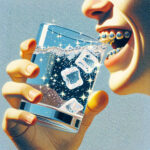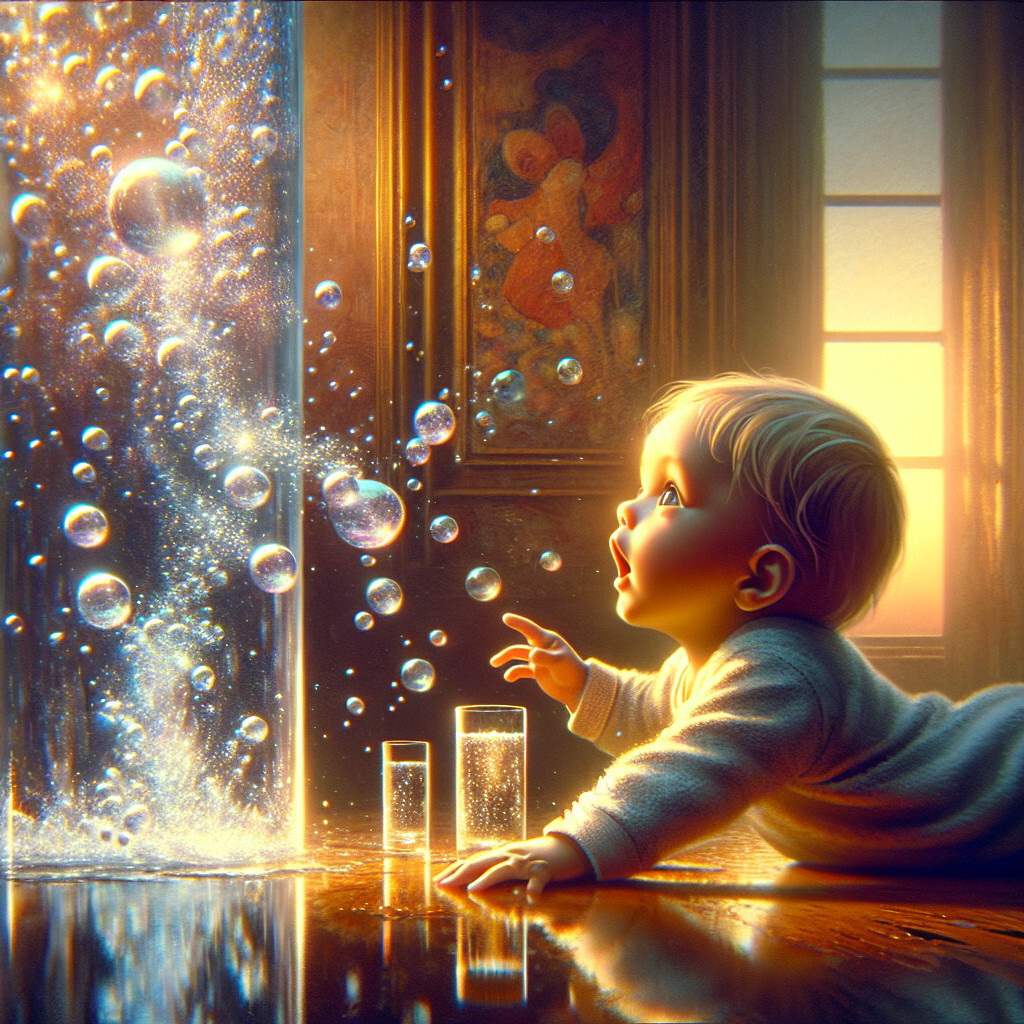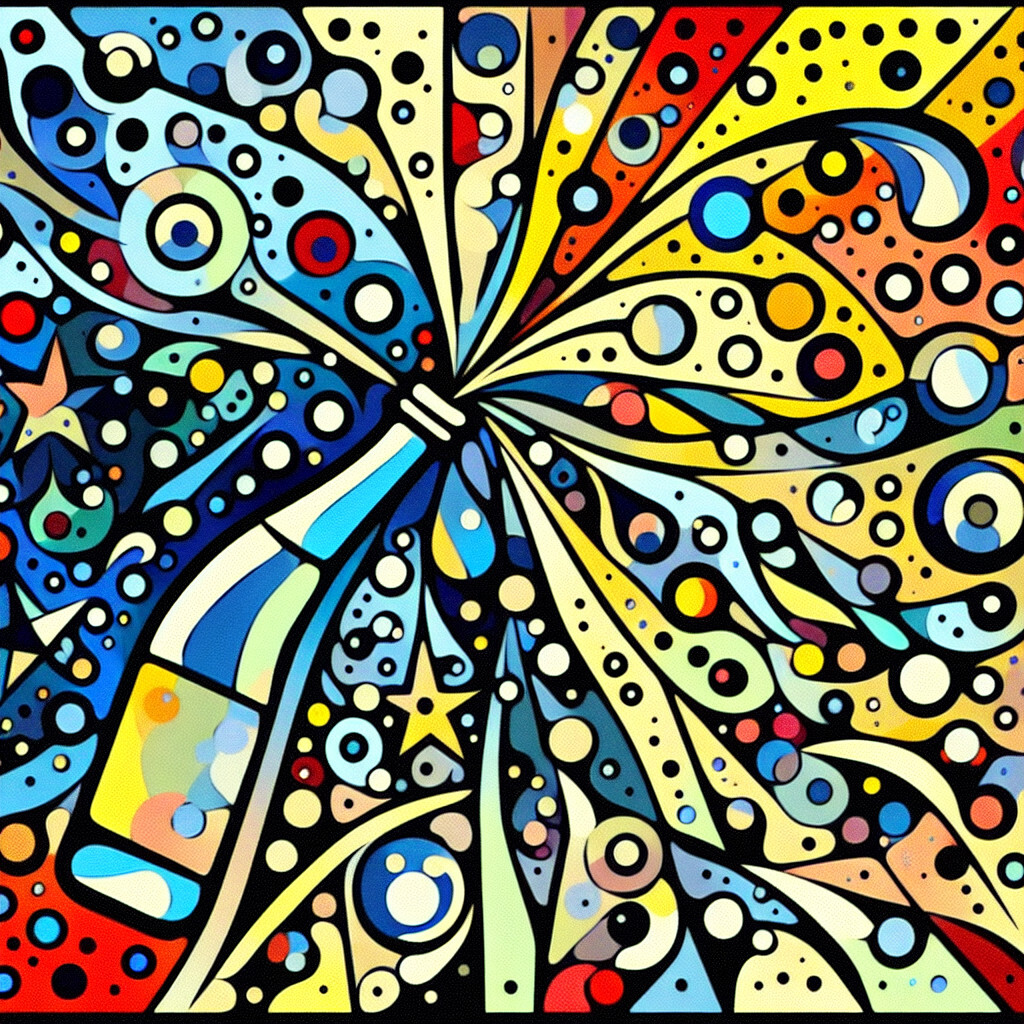-
Table of Contents
“Flavored Water with Retainers: Sip, Smile, Repeat!”
Introduction
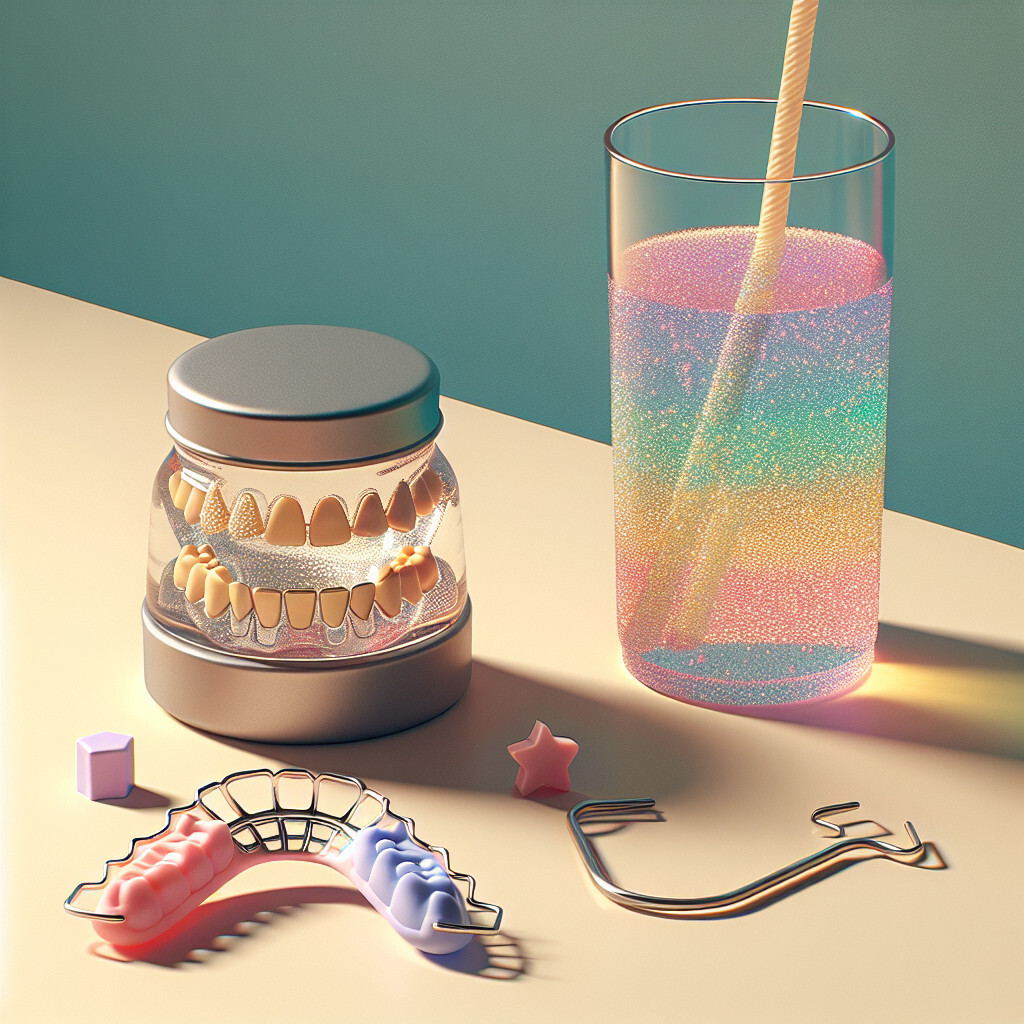
Wearing retainers is a crucial part of dental care after braces, and it’s important to know how different foods and drinks can affect them. Flavored water is a popular beverage choice, but its impact on retainers depends on the ingredients. While drinking water is generally safe with retainers, flavored water often contains acids and sugars that can potentially damage the retainer material and lead to tooth decay. Therefore, it’s essential to understand the specific types of flavored water you consume and how they might affect your oral health while wearing retainers.
Understanding the Impact of Flavored Water on Retainers
Retainers are a crucial part of orthodontic treatment, helping to maintain the alignment of teeth after braces are removed. However, wearing retainers comes with certain responsibilities, one of which is ensuring they are kept clean and free from damage. A common question that arises among retainer wearers is whether it is safe to drink flavored water while wearing them. This article aims to provide a comprehensive understanding of the impact of flavored water on retainers.
Flavored water, a popular beverage choice for many, is often perceived as a healthier alternative to sugary drinks like soda. It is essentially water infused with natural or artificial flavors, and sometimes sweeteners. While it may seem harmless, the impact of flavored water on retainers is a topic that warrants careful consideration.
The primary concern with drinking flavored water while wearing retainers is the potential for damage to the retainer material. Many flavored waters contain citric acid, a common ingredient used to enhance flavor and prolong shelf life. This acid, while safe for consumption, can be harmful to retainers. Over time, the acidity can erode the plastic material of the retainer, leading to a weakened structure and reduced effectiveness.
Moreover, flavored water often contains sweeteners, whether natural or artificial. These sweeteners can stick to the retainer, creating a breeding ground for bacteria. This not only compromises the hygiene of the retainer but can also lead to oral health issues such as tooth decay and gum disease.
However, it’s important to note that the occasional consumption of flavored water is unlikely to cause significant harm to your retainer. The key lies in moderation and proper retainer care. If you do choose to drink flavored water while wearing your retainer, it is advisable to rinse your mouth and clean your retainer thoroughly afterward. This helps to remove any residual sweeteners or acids that may have adhered to the retainer.
In addition, it’s worth considering the type of retainer you have. Removable retainers offer more flexibility as they can be taken out while eating or drinking. On the other hand, permanent or fixed retainers, which are attached to the back of the teeth, require more caution as they cannot be removed for cleaning after consuming flavored water.
In conclusion, while it is not strictly prohibited to drink flavored water with retainers, it is essential to be aware of the potential risks. The acidity and sweeteners in flavored water can potentially damage the retainer and contribute to oral health issues. Therefore, it is recommended to limit the consumption of flavored water while wearing retainers, and to maintain good retainer hygiene by cleaning it thoroughly after consumption.
Remember, retainers play a vital role in maintaining your newly aligned smile. Taking care of them should be a top priority. If you have any concerns or questions about what you can and cannot consume while wearing your retainers, it is always best to consult with your orthodontist. They can provide personalized advice based on your specific type of retainer and oral health needs.
Can Flavored Water Damage Your Retainers? A Comprehensive Guide
Retainers are a crucial part of orthodontic treatment, helping to maintain the alignment of your teeth after braces. However, they require careful maintenance to ensure their longevity and effectiveness. One common question that arises among retainer wearers is whether it’s safe to drink flavored water while wearing them. This article aims to provide a comprehensive guide on this topic.
Flavored water, a popular beverage choice for many, is often perceived as a healthier alternative to sugary drinks like soda. It’s refreshing, hydrating, and comes in a variety of flavors to suit different palates. However, when it comes to drinking flavored water with retainers, there are several factors to consider.
Firstly, it’s important to understand the composition of flavored water. While it’s primarily water, it also contains various additives such as natural or artificial flavors, sweeteners, and sometimes even acids. These additives, particularly the sweeteners and acids, can potentially harm your retainers.
Artificial sweeteners, despite being calorie-free, can lead to bacterial growth in the mouth. Bacteria thrive on sugar and sweeteners, and when they multiply, they produce acids that can erode the plastic material of your retainers, causing them to become discolored, warped, or even cracked. This not only compromises the fit and effectiveness of your retainers but can also lead to oral health issues like cavities and gum disease.
Acids, on the other hand, can directly damage your retainers. Citric acid, commonly found in citrus-flavored water, can degrade the plastic material of your retainers over time. This can result in your retainers becoming brittle and eventually breaking. Moreover, the acid can also harm your tooth enamel, increasing your risk of tooth sensitivity and decay.
Therefore, while flavored water may seem harmless, it can potentially damage your retainers and negatively impact your oral health. However, this doesn’t mean you have to completely avoid flavored water. The key is moderation and proper retainer care.
If you choose to drink flavored water, it’s advisable to remove your retainers beforehand. This prevents direct contact between the beverage and your retainers, thereby reducing the risk of damage. After consuming flavored water, wait for at least 30 minutes before reinserting your retainers. This allows your saliva to neutralize the acids in your mouth and minimize potential harm to your retainers and teeth.
Additionally, maintaining good oral hygiene is crucial. Brush and floss your teeth regularly to remove food particles and bacteria. Clean your retainers daily using a soft toothbrush and non-abrasive toothpaste or a retainer cleaning solution. This helps to keep them in good condition and prolong their lifespan.
In conclusion, while it’s not recommended to drink flavored water with retainers, it’s not entirely off-limits either. By practicing moderation, removing your retainers before drinking, and adhering to good oral hygiene practices, you can enjoy flavored water without compromising the health of your retainers or your teeth. As always, if you have any concerns or questions, it’s best to consult with your orthodontist or dentist for personalized advice.
The Truth about Drinking Flavored Water with Retainers
The truth about drinking flavored water with retainers is a topic that has been subject to much debate and confusion. Many individuals who wear retainers, whether they are for orthodontic purposes or to prevent teeth grinding, often wonder if they can enjoy their favorite flavored water without causing damage to their dental appliances. The answer to this question is not as straightforward as one might hope, and it largely depends on the type of flavored water in question.
Firstly, it is important to understand why there might be concerns about drinking flavored water with retainers. Retainers are typically made from a combination of plastic and metal, materials that can potentially be damaged or discolored by certain substances. Additionally, retainers are designed to fit snugly against the teeth, creating a space where liquid can become trapped and potentially lead to tooth decay or other dental issues.
Flavored water, on the other hand, can vary greatly in its composition. Some flavored waters are simply water with a hint of natural flavor, such as lemon or cucumber. These types of flavored waters are generally safe to drink with retainers, as they do not contain sugars or acids that could harm the retainer or the teeth. However, it is always a good idea to rinse the mouth and the retainer with plain water after drinking to ensure that no residue remains.
On the other hand, some flavored waters contain added sugars, artificial flavors, or acids. These types of flavored waters can potentially cause problems if consumed with retainers. Sugars can lead to tooth decay, especially if they become trapped between the retainer and the teeth. Artificial flavors and acids can potentially discolor or damage the retainer material. Therefore, it is generally recommended to avoid these types of flavored waters while wearing retainers.
Moreover, it is also worth noting that drinking flavored water with a retainer is not the same as drinking it without. The retainer can create a barrier that prevents the flavored water from fully reaching the teeth, potentially altering the taste. Some individuals may find this change in taste unpleasant, while others may not notice a difference.
In conclusion, whether or not one can drink flavored water with retainers largely depends on the type of flavored water in question. Natural, unsweetened flavored waters are generally safe, but it is always a good idea to rinse afterwards. Flavored waters with added sugars, artificial flavors, or acids should be avoided to prevent potential damage to the retainer and teeth. As always, when in doubt, it is best to consult with a dental professional. They can provide personalized advice based on the specific type of retainer and the individual’s oral health. Remember, maintaining good oral hygiene practices, including proper care of the retainer, is crucial for ensuring the longevity of the retainer and the health of the teeth.
Debunking Myths: Is Flavored Water Safe for Retainers?
Retainers are a crucial part of orthodontic treatment, helping to maintain the alignment of teeth after braces are removed. However, wearing retainers comes with certain responsibilities, including proper cleaning and care to ensure their longevity and effectiveness. One common question that arises among retainer wearers is whether it is safe to drink flavored water while wearing them. This article aims to debunk myths surrounding this topic and provide a clear answer.
Flavored water, a popular beverage choice for many, is often perceived as a healthier alternative to sugary drinks like soda. It’s refreshing, hydrating, and comes in a variety of tantalizing flavors. However, when it comes to the interaction between flavored water and retainers, the answer isn’t as straightforward as one might hope.
The primary concern with drinking flavored water while wearing retainers is the potential for damage to the retainer material. Retainers are typically made from a combination of plastic and metal, both of which can be susceptible to damage from certain substances. The flavoring agents in flavored water, particularly those that are acidic or contain sugar, can potentially degrade the plastic component of the retainer over time. This could lead to the retainer becoming less effective at maintaining the alignment of your teeth.
Moreover, flavored water often contains additives like citric acid and natural or artificial sweeteners. These substances can stick to the retainer, creating a breeding ground for bacteria. Over time, this can lead to plaque buildup and tooth decay. Therefore, it’s not just the retainer that could be at risk, but also your oral health.
However, it’s important to note that not all flavored waters are created equal. Some brands contain minimal additives and are relatively low in acidity, making them less likely to cause damage. Therefore, if you’re a fan of flavored water and wear a retainer, it’s worth taking the time to read the label and choose a brand that’s low in sugar and acidity.
Despite this, the safest course of action is to remove your retainer before consuming flavored water. This eliminates the risk of damage or bacterial buildup. After drinking, it’s recommended to rinse your mouth with plain water before reinserting the retainer. This helps to wash away any residual flavoring agents that could potentially harm the retainer or your teeth.
In conclusion, while it’s not strictly forbidden to drink flavored water while wearing a retainer, it’s not the best practice. The potential risks to both the retainer and your oral health make it a habit worth avoiding. Instead, opt for plain water when wearing your retainer, saving the flavored water for times when the retainer is out. Remember, the key to maintaining your newly aligned smile is not just wearing your retainer as directed, but also taking proper care of it. By being mindful of what you eat and drink while wearing your retainer, you can ensure its longevity and effectiveness, keeping your smile straight and healthy for years to come.
Q&A
1. Question: Can I drink flavored water while wearing my retainers?
Answer: Yes, you can drink flavored water while wearing your retainers, but make sure it doesn’t contain any sugar or acid to avoid damaging them.
2. Question: Will flavored water stain my retainers?
Answer: Flavored water can potentially stain your retainers if it contains artificial coloring.
3. Question: Can drinking flavored water damage my retainers?
Answer: If the flavored water contains sugar or acid, it can potentially damage your retainers or lead to tooth decay.
4. Question: Should I remove my retainers before drinking flavored water?
Answer: It’s best to remove your retainers before drinking flavored water, especially if it contains sugar or acid, to prevent potential damage or staining.
Conclusion
Yes, you can drink flavored water with retainers. However, it’s important to avoid flavored water that contains sugar or acidic ingredients as they can lead to tooth decay. Always rinse or brush your teeth after consuming to prevent any residue from sticking to your retainers.

